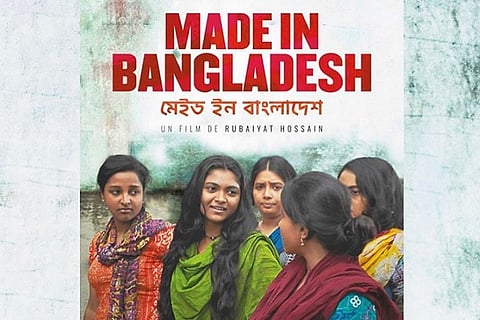

Warning: Spoilers ahead
There is no dearth of choice at the Bengaluru Film Festival (BIFFES), with organisers calculating that one can only watch about 35 films out of the 220 being screened, if they planned their days well. While I was spoilt for choice, what attracted me to Made in Bangladesh is its short duration of 95 minutes, and the fact that it was directed by a woman, Rubaiyat Hossain. What I didn't expect was to find the film so evocative, especially with parallels to India.
The film is about the exploitation of labour in the garment industry, perhaps a dry subject, but which Rubaiyat handles skilfully to entertain with sensitivity.
The film focuses on the fact that female labourers are chosen to do the work in the garment industry in Bangladesh as they deemed “easier to control” and “can be paid less”, as an NGO worker puts it in the film. The garment factory where the women work starts denying them their overtime pay, which is when the women realise they are being exploited, and decide to start a union.
The story of how they work to start a union to demand their rights, and the struggles they face in their personal lives and friendships as well, are given equal importance, underlining the saying “the personal is political”. For instance, we see Shimu (played by Rikita Nandini Shimu) leading the charge to form the union. And while we see her stand up to her rude, exploitative bosses, we also see her struggle with a husband who starts pressurising her to quit her job.
When Shimu discloses to a more privileged NGO worker that her husband wants her to quit the job, she is told that she must stand up for herself. To this, Shimu says wisely, "Ma'am, we are women. We're screwed if we're married and screwed if we're not."
Finally, her husband tells her she can continue working, but only if she is ‘modest’. Shimu agrees to wear the hijab, and one gets the feeling and she is compromising on the battle at home, to win the war of empowerment outside. In portraying struggles like these, the film shows empowerment for women isn’t a linear ladder which they can keep climbing higher, but a path fraught with problems.
I initially expected the film would be something of a more privileged women telling disadvantaged women how to lead their lives. But I was pleasantly surprised to see the role of privileged characters in the film was, for once, all about empowering the garment factory workers, and then taking a step back. For instance, they teach Shimu how to use a smartphone, give her a book her rights as per the labour laws, and tell her how to go about registering her union. After that, the NGO takes a step back and the story remains about Shimu and her colleagues.
As I watched the Shimu’s story, it was easy to forget that it’s a film from another country. The parallels between what women in low-income communities in India so often face, and the visuals of what women in Bangladesh face, were striking. The misogyny and exploitation of women, their clothing, the marketplaces, the heat that emanates from everything: all these feel extremely evocative of India.
The film Made in Bangladesh is especially pertinent at a time when there is a lot of suspicion and xenophobia against immigrants from the neighbouring country. India is currently seeing a spate of protests against the contentious Citizenship Amendment Act. The act seeks to give Indian citizenship on the basis of religion, and excludes Muslims from its ambit. In such a context, it is easy to forget that the Bangladesh has a shared history and culture with ours.
Watch the trailer here.
Made in Bangladesh is nominated for an award in the Asian films category at BIFFES. This is the director's third foray into making a film after Meherjaan (2011) and Under Construction (2015), both of which earned Rubaiyat Hossain global acclaim and awards.